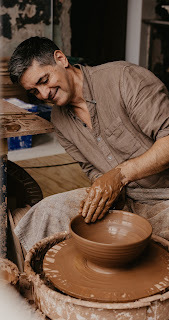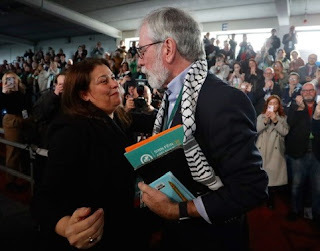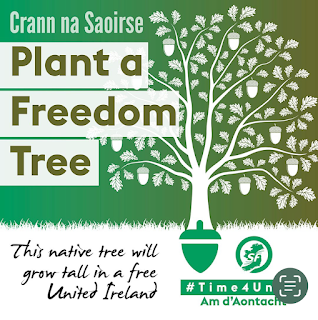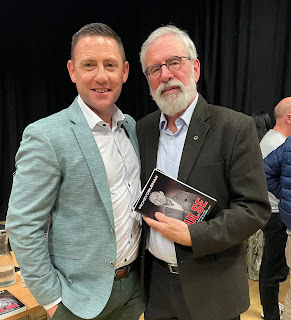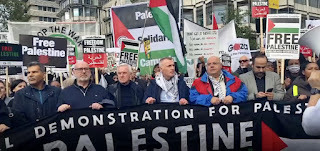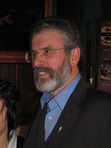Gerry Adams's Blog, page 9
January 1, 2024
A Boy named Jay: 2024 – Momentum toward Unity Polls set to increase: A New Year Wish
ABoy named Jay
Idid a book signing for Christmas at An Fhuiseog’s stand in the Kennedy Centre.It was a pleasant hour of banter and craic, meeting old friends and making newones. Gerry Kelly was there just before me but he escaped when I arrived. So itwas just me and the punters. And RG and Maggie who was selling all matter ofgifts for An Fhuiseog.
Thebook buyers were a mixed bunch. Grannies and Grandas as well as young couplesor lone shoppers. Mostly locals with a few stragglers from out of town.From Tyrone and Tandragee, Kilrea and Dublin, two sisters from Australia,relatives of the late Albert Fry, Gael and renowned singer í nGaeilge. SomeNewry neuks and a family from Dundalk.
Therewere even folks from North Belfast.
Everyonewas in good form, including the wheel chair warriors and walking stick users.There was an epidemic of young people. Selfie aficionados. TheTic Toc generation. Full of craic.
Andthere was a boy named Jay. I noticed him hovering shyly around the table whereI was seated. A dark haired neatly dressed young fellah on his own. Eventuallyhe approached our table.
‘Howmuch is The Black Mountain book? He asked.
‘Twelvequid’ I replied.
Hewas obviously disappointed.
‘Iwas going to get it for my Daddy for Christmas’.
‘Howmuch have you got’? I asked.
Hescooped a handful of coins out of his pocket.
‘Six pounds and fifty pence’ he replied.
‘Giveme a fiver’ I said.
Hehesitated.
‘Ihave to get my lunch’ he said.
Buthe wasnt being calculating. Or cynical. Merely thinking aloud innocently theway young people do when they have options to consider.
‘Whatsyour name?’ I asked.
‘Jay’he said.
‘Wudyou be availible for negotiations at Hillsborough?’ I mused.
‘Givethe wee lad a book’ RG ordered me with a smile, the way he does whenhe gets all bossy and assertive.
So I did. Jay smiledangelically at us as I signed his book. I hope his Daddy liked his present. Jayis what Christmas is all about.
Ahappy new year to you and your Da and Mammy and all your family.
2024 – Momentum toward Unity Polls set to increase
After weeks, months, of public and privatenegotiations it is still not clear as 2023 draws to a close what the future ofthe Executive and Assembly will be. The British government says it has deliveredits final word on the issue. The various party positions remain as they were.We shall see what the New Year brings on this.
In the meantime, with or without the NorthernAssembly, what we can be certain of is that 2024 will see the momentum grow forthe unity referendum promised in the Good Friday Agreement. In addition, with ageneral election in the South on the horizon, the issue of a Citizens’ Assemblyto discuss the future of Ireland will take on an increasing importance.
2023 saw the conversation on constitutional changegathering strength. The Sinn Féin Commission on the Future of Ireland concludedthe year with its 11th public initiative. This time in the GalwayGaeltacht. There were also stalls at farming events, North and South, stalls atFreshers day in the universities, and leaflets distributed everywhere.
Meetings are already planned for Fermanagh and WestTyrone in February and initial conversations have begun about similar meetingsbeing held in the USA and Canada. Submissions to the Commission on the kind offuture you the reader would like can be sent to www.sinnfein.ie/futureofireland
2023 also saw the emergence of a voices from theProtestant/Unionist/Loyalist section of our people openly considering and insome cases advocating, the merits of Irish unity. The year saw space beingcreated for people who think this way to participate in events held by the SinnFéin Commission. Events were also held by the New Ireland Group whichfacilitated people from Protestant, Unionist and British backgrounds whosupport maintaining the union with Britain having their say.
In the last year the Derry City & StrabaneDistrict Council working group on Irish Unity initiated a consultation amongratepayers on Irish unity. The first phase of this consultation resultedin hundreds of submissions on the topic of Irish unity. There have beenIrish unity working groups set up in Belfast City Council, Newry, Mourne andDown District Council, Mid Ulster Council and Donegal County Council.
The SDLP’s New Ireland Commission also held aseries of public events and the Irish News came out in support of a Citizens’Assembly. Ireland’s Future worked hard during the year with public eventsattracting people from the business community and academia, as well as a seriesof meetings with political parties across the island.
On 15 June 2024 Ireland’s Future will be holding amajor conference – Pathway to Change – in the SSE Arena in Belfast. Among thosealready committed to speak are Professor Brendan O’Leary, Jarlath Burns,President of the GAA, Mary Lou McDonald TD, Ivana Bacik TD, John Alderdice,David Adams, trade union leader Mick Lynch, Claire Hanna MP and Claire Mitchelland many more. Tickets are already available and given that Ireland’s Futurepast events have sold out now is the time to book. https://www.ticketmaster.ie/ireland-s-future-presents-pathway-to-change-belfast-15-06-2024/event/38005F42B36C13BC
In August An Taoiseach Leo Varadkar acknowledgedthat we are now ‘on the path to unification’. He said that he believes “therewill be a United Ireland in my lifetime.” Responding Mary Lou McDonald urgedthe Irish government to begin planning for that future. Leo Varadkar she saidhas “correctly said that we’re on the path to Irish unity. The question and thechallenge now for him and for the government is what are they going to do aboutthat?”
Throughout 2023 United Ireland activists havebeen involved in walking for unity, swimming for unity and running for unity aswell as planting Crann na Saoirse – a freedom tree- in support of Irish Unity.
Gaels le Chéile too continues to attract growingsupport from GAA grass root members. A packed hall during Féile an Phobail inAugust heard a senior panel of Gaels articulate the importance being active onthe need for a Citizens’ Assembly. The panel included Antrim Gaels Jane Adamsand Paddy Cunningham, former Tipperary hurler Timmy Hammersley, Kerry nativeand former Offaly senior football manager Stephen Wallace, Margaret Flynn ofO’Donovan Rossa and Niamh McElduff Carrickmore footballer. Jarlath BurnsPresident Elect of the GAA was in the audience.
Mary Lou McDonald speaking at Sinn Féin’s Ard Fheisin November said that this is the time for our generation to write the nextchapter on unity – to build a new Ireland. She said: “Government must plan fordemocratic constitutional change. That means a Citizens Assembly on unity. Theday is coming when everyone on this island will have their say in referendums.Each vote counting equally, no vetoes, no shifting of the goal posts. Momentumis building, the conversation is live, history is happening now. Irish Unity isthe very best opportunity for the future. In the words of Rita O’Hare, “We mustkeep going. A United Ireland
lies ahead”.
So, 2023 was a very busy year. Lots ofactivism. 2024 is already shaping up to be even busier. So, join the campaignsfor a Citizens’ Assembly and for the unity referendums. Have your say on thefuture and help shape the new Ireland.
A New YearWish
Bliain Úr Faoi Mhaise Daoibhse Go Leir.
I received this verse in a Christmas card. Very appropriate.
Our New Year Wish
Peace and justice where life is hell;
In Gaza, the West Bank and Israel,
In Russia, Ukraine and Afghanistan,
In South Sudan and Pakistan,
In Myanmar, Mali and Somalia,
In Yemen, Chad and Ethiopia,
In Cameron, Darfur and Syria
In Mozambique, Congo and Libya
In Lebanon, Kosovo and Iraq,
And especially, Nagorno Karabakh
(The last is personal, as you may know,
For family there, a desperate blow)
This list goes on; in this cruel time
Hope and history do not rhyme.
But wars must end and fighting cease.
Witness today, Ireland at peace.
So friends and family, far and near,
Do not despair of the coming year.
A Christmas Gift: Journalists under attack by Israel: Defend Irish neutrality
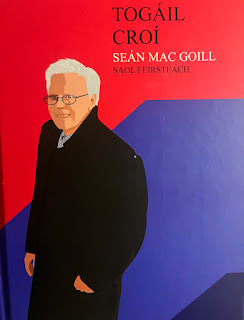 A ChristmasGift
A ChristmasGift
I am recommending this new book - Togáil Croí. Seán Mac Goill - as a great Christmas present for you dear reader andfor someone you love. It is bilingual and veryaccessible. Irish and English columns side by side, page by page. It is beautifullydesigned, colourful and with many graphics and photos as befits a bookwhich celebrates the work of the people it is about.
Seán Mac Goill is one of that band of visionariesand activists which gave us the new Bombay Street after the original BombayStreet was destroyed in the 1969 pogroms, the urban Gaeltacht on BótharSeoighe, Ballymurphy Enterprises, the Whiterock Industrial Estate, Garáiste anPhobail and many other projects going back to the mid 1960s. It is also aboutthe Irish language in West Belfast and the wider cultural revolutionacross the city.
While Seán is singled out for special mention thisbook is about all those who were involved and their pioneering families. It isa tribute to the critical role played by these Irish speaking visionaries and do- ers.
This book is about the structures for education,employment, progress, and self help which they created despite fierceopposition from an actively hostile unionist and British regime. It also drawsheavily on archival material from An Spás Dín in the wonderful Coláiste Féirste in the Gaeltacht Quarter.
Have no doubts about theirachievements. This is a hugelysuccessful group of progressive Irish men and women in one of the most ‘economically impoverished yet intellectually and culturallyrich areas in Ireland’. They persisted. And they prevailed. And we all benefitted.
It also gently reminds us of the type of languageactivism which is needed for the future. The activism of Na h’abhair é. Dean é. Don’t talk about it. Do it.
I am a huge admirer of all the people celebrated in this veryimportant book. I am constantly inspired and encouraged by their example. ReadTogáil Croí and you will be inspired also. So will whoever is lucky toget it from you in theirstocking this Christmas.
Availible from An Ceathrú Póílí, An Culturlann. Bothar nabhFál, Belfast.
Journalists under attack byIsrael
For as far back as I can rememberthe phrase ‘truth is the first casualty of war’ has been used when wars are analysed.The phrase is very old. The first time we know it was used was by Greeksoldier, poet, and playwright Aeschylus in the fifth century BC who said: ‘In war,truth is the first casualty.’
We Irish have long experience ofthis. During the decades of conflict inour own place political censorship by the British and Irish governments and theestablishment media was widespread. But media manipulation goes back further. Inher exceptional book ‘Ireland – the Propaganda War’ Liz Curtis reminds us thatthe arrival in the North of the BBC in 1926 saw that organisation institutionalisea unionist ethos within its news coverage.
Quoting from a BBC document in1930 Liz Curtis wrote: The BBC Regional Service ‘reflects the sentiments of thepeople who have always maintained unswerving loyalty to British ideals and toBritish culture. Northern Ireland relies on broadcasting to strengthen itscommon loyalties with Britain.’ There were of course exceptions within the BBCand outside of it. There were journalists prepared to lift their heads abovethe parapet to tell the truth. Fair play to them but they didn’t face whattoday’s journalists in Palestine face on a daily basis.
Israeli forces are systematicallytrying to shut down the truth in a ruthless and methodical campaign ofassassination of journalists.
At the weekend Al Jazeera journalist SamerAbudaqa was killed. His colleague Wael Dahdouh was wounded. Only weeks ago fourmembers of Wael Dahdouh’s family, including his wife Amna, son aged 15, daughteraged 7 and grandson aged 1 were killed. They were murdered when Israeli forcesblew up the house they were sheltering in. The house was in a neighbourhoodthat the Israeli government said was a safe zone.
The Committee to Protect Journalists reported at theweekend that at least 64 journalists, most Palestinian, and media workers areamong the almost 20,000 killed by Israel forces so far. At least 13 others havebeen injured and three journalists are reported missing. In addition, journalistsin the west Bank are routinely and savagely assaulted by Israeli soldiers andsettlers.
The Israeligovernment’s objective is to try and control the narrative – to excuse theirgenocidal campaign against the people of Gaza but in particular children. Theyalso seek to keep on board those few governments who shamefully support turningGaza it into a graveyard for the innocent.
Iwelcome the Irish government’s recent effort at last week’s EU summit, alongwith Spain, Malta and Belgium, to persuade the EUto adopt the demand for a humanitarian ceasefire. According to An Taoiseach LeoVaradkar, ‘The position of the overwhelming majority of the EUcountries now is that there should be a ceasefire.’ However the summit failed to reach agreement.
This Monday will beChristmas Day. There is little prospect of the slaughter stopping. But if it isit will be for a pause. That is not acceptable. The deliberate and callousshooting dead of two Christian women –Nahida Khalil Anton and her daughter Samar as theywalked to a convent of nuns in the compound of the Holy Family Parish - theshooting dead of three Israeli hostages by Israeli soldiers, and the use of abulldozer to crush Palestinians seeking refuge at Kamal Adwan Hospital, adds tothe abundant evidence that Gaza is a killing field for the Israeli government.
This weekendas we celebrate and reflect on the Christmas story let us applaud thosejournalists under threat every second of every day in Gaza and the west Bankand recommit ourselves to the enormous solidarity campaign for the Palestinianpeople that has seen many millions across the world declare – We are allPalestinians Now.
Defend Irish neutrality
At a time whensignificant wars are raging – Russia’s invasion of Ukraine, Israel’s assaultand genocide against the Palestinian people, and in the Sudan and Sahel regionof Africa –and elsewhere, Irish neutrality has never been more important.International tension and disputes between nations and within nations are notnew. The establishment of the United Nations after the Second World War createda new paradigm – a new international structure to resolve conflicts.
It has notbeen easy. The system is not perfect. The recent use of the veto by the UnitedStates government to block a ceasefire resolution for Gaza at the UN isevidence of the fragility of the system. But the UN remains the best means forresolving disputes. And Irish forces in peacekeeping missions make an enormousand positive contribution to peace.
The announcement by Fianna Fáil leader and TánaisteMicheál Martin last month that the Irish government is to scrap the triple locksystem is a retrograde step. The triple lock is amechanism which sets out the criteria for the involvement by 12 or more Irishsoldiers in peace missions overseas. For troops to be deployed requires thatthe action is mandated by the United Nations; must be approved by the governmentand then by the Dáil through a resolution.
This is not the first time that the future of thetriple lock or of neutrality has been raised. Fine Gael supported dumping thetriple lock two years ago but Fianna Fáil in its 2020 manifesto for the generalelection said it would ‘fully maintain’ neutrality and the triple lock.
And therein lies the rub. Irish neutrality and thetriple lock are seen as political Siamese twins – inextricably linked. Thescrapping of the triple lock would dangerously undermine neutrality and openthe door for a future Irish government joining NATO – a decision Micheál Martinhas already said does not require a referendum but simply a decision ofgovernment. Following the invasion of Ukraine Martin said: “We need to reflect onmilitary non-alignment in Ireland and our military neutrality.”
The Irish government is treading a dangerous path. Neutralityis and should remain the cornerstone of Irish Foreign Policy. It allows anIrish government to play a positive role in the wider world, especially indefence of human rights. It shouldn’t be left to government politicians todecide whether Irish soldiers are sent to fight wars for the big powers.
December 19, 2023
Words for Shane: The de-humanising of the Palestinians: Christmas Ceol
Words for Shane
Last Friday I travelled to Nenagh for the funeralof Shane MacGowan. It was a sad and yet joyous event with family and friendslifting their voices and their hearts as a succession of musicians played someof Shane’s best known songs, including the exuberant Fairytale of New York, CórCúil Aodha, including Seán O’Sé and Seán O’Riada’s son Peadar also did whatthey do best.
I did a Reading at the mass and made a few remarks.This is what I said:
“Victoria asked me to say a few words. That’s whatShane wanted.
Mo comhbrón leatsa agus leis bhur gclann goh’airithe deirifiur Shane and a Athair, Siobhán agus Maurice.
Go raibh maith agat an Athair Pat.
My words are words of gratitude.
Gratitude for Shane’s genius – for his songs.
His creativity and his attitude.
Gratitude for his humour and his intelligence andhis compassion.
Grateful for his vulnerability, his knowledge andhis modesty.
Gratitude for his celebration of the marginalised,the poor, our exiles and underdogs.
Grateful for the Pogues and all our music makers,all our dreamers of dreams.
Thankful to Shane’s carers.
Proud of how Shane deepened our sense of Irishnessand our humanity.
Grateful for his rejections of the revisionism oftime serving fumblers in greasy tills.
Glad that he stood by the people of the North.
In war and in peace and that he was proud ofTipperary’s fight for Irish freedom and his family’s role in this.
Thankful for his poet’s eye for words of loveand betrayal, justice and injustice, rejection and redemption.
Grateful that Shane lifted us out of ourselves and thathe never gave up.
Delighted that he empowered us to dance and sing,to make fun and to shout and yell and laugh and cry and to love and to be free.
Ar laoch thú Shane.
Ar ghile mear.
Fíle, Ceoltóir, fear uásal.
Your music will live forever.
You are the measurer of our dreams.
Go raibh maith agat Shane MacGowan.”
The de-humanising of the Palestinians
Last Sunday was the 75th anniversaryof the Universal Declaration of Human Rights. It was a response to the horrorof the Second World War, and in particular the holocaust of European Jews andmurder of countless millions of trade unionists, gay people, socialists andothers the Nazi regime regarded as inferior. Its first sentence encapsulationwhat many hoped would be the dawn of a new era – ‘All human beings are bornfree and equal in dignity and rights.’
That same year the Israeli state was born andPalestinian hopes for their future died in the Nakba – the great catastrophewhen hundreds of thousands were evicted from their homes, forced into refugee campaignsand thousands more killed.
In the 75 tears since then the Israeli state hasbreached successive United Nations resolutions. Its treatment of thePalestinians, especially at this time, mimics what many suffered under fascism.
Today the propaganda battle being waged by theIsrael government in defence of its genocide in Gaza and its ethnic cleansingof the west Bank, follows a predictable pattern used by colonial powers forcenturies, including the Nazis.
The French writer Jean-Paul Sarte wrote: “How canan elite of usurpers, aware of their mediocrity, establish their privileges? Byone means only: debasing the colonised to exalt themselves, denying the titleof humanity to the natives, and defining them simply as absences of qualities –animals, not humans. This does not prove hard to do, for the system deprivesthem of everything.”
For centuries the Irish were depicted by theBritish state as stupid, ape like, idle, work-shy, savage, not human. The 19th centuryIrish leader Daniel O’Connell was described as “scum condensed of Irish bog.”
The British state, its writers and publicationspromoted a racist view of the Irish that excused the widespread imposition ofpoverty and hunger. In 1846 The Times wrote: “For our own part we regard thepotato blight as a blessing. When the Celts once cease to be potatophagi, theymust become carnivorous. With the taste of meats will grow an appetite for them… “
One English writer wrote in 1860 as he travelled inIreland: “I am haunted by the human chimpanzees I saw along that hundred milesof horrible country … to see white chimpanzees is dreadful; they were black,one would not see it so much, but their skins, except where tanned by exposure,are as white as ours.”
Treating other human beings as animals, and deservingof no respect, makes it easy to slaughter them, to colonise and exploit them.
In our own time British propaganda machine wasbuilt on a strategy of merging all governmental structures; the judiciary,the law, the police and the media, into one structure with the aim of defeatingrepublicans.
This meant policies of censorship and mediamanipulation that perpetuated the decades of conflict. It reinforced theconditions for division and violence. It deliberately covered up British stateviolence, its torture of prisoners and its collusion with unionist deathsquads. And it was a major obstacle to the necessary dialogue needed to chart acourse toward peace.
And so it is in the Israeli state’s prosecution ofa war they claim is against Hamas but is in fact against the Palestinianpeople. The propaganda strategy used by British colonialism is at work in Gazaand the west Bank. Israeli politicians label Palestinians as ‘human animals.’According to the Israeli Deputy Mayor of Jerusalem Aryeh Yitzhak King they “aren’thuman beings and not human animals. They’re subhuman and that’s how they shouldbe treated.” His solution? Use Bulldozers to “cover all these hundreds ofants, while they're still alive.” He and others in the Israelistate defend the denial of the basic necessities of life – food, water,energy, medical care, shelter. Children are dying in their thousands from bombsand snipers and are now starving from hunger.
Netanyahu’s government believes they don’t deservecompassion. Palestinian journalists in Gaza are killed in their dozens.Broadcasters from other states are refused entry by Israel and disseminatetheir news from Tel Aviv and Jerusalem making it easier to control thenarrative. Occasionally some are allowed in as embedded journalists travellingwith Israeli forces. And we know how that worked in Iraq and Afghanistan.
At a time when the media claims that the Israel governmentis killing a greater proportion of civilians than in any other war in the last100 years and prisoners are being killed in Israeli prisons, the failureof many other governments to take a stand against Israel’s genocidal policy isshameful. The Universal Declaration of Human Rights seems now just a distantmemory.
Christmas Ceol
If you are looking for musical stocking fillersthis column recommends two bits of ceol. First off is Fergus O Hare’s new CD –Deep in my Heart.
Fergus is Belfast’s singing botanist, guitarist,Gael, teacher, broadcaster, long time activist and full time wonderful humanbeing. He is in fine voice in this exceptional collection of his favouritesongs, including Victor Jara, Aird Uí Chuain and We Shall Overcome. Deep in myHeart is available at An Ceathrú Póilí, An Cultúrlann, Bóthar na bhFál.Belfast.
Next up is Piaras Ó Lorcáin. Piaras is representativeof today’s generation of young Irish singers. From South Armagh he is steepedin the Gaelic traditions of the Oriel. An active member of Gaelphobal Ard MhacaTheas.
Piaras has made his mark at Irish singingcompetitions including this year’s under 35 Sean Nós Competition ar Oireachtasna Samhna. Bláithín Mhic Cana who accompanies Piaras on this CD took thirdplace in the Women’s Sean Nós Competition.
Piaras has an exception singing voice wonderfullysuited to the five Irish language songs in this collection which includes Tá‘na Lá and Gráinne. You will not be disappointed with this fine CD.
Available also at An Ceathrú Póilí, AnCultúrlann. So make someone happy this Christmas. Give them ceol.
December 4, 2023
Where to for Loyalism?: Peace requires respect for Palestinian rights: The Far Right must be challenged
Where to for Loyalism?
I have met many loyalists over a very long time. In prison. Out ofprison. In secret or in private talks going back to the 1970s. And many timessince then. I like to think that some of us became friends. Or at least we becamefriendly. Some loyalist leaders played a crucial role in the negotiations whichled to the Good Friday Agreement. They deserve great credit for that. That wasthen. Unfortunately some of those involved have died or are no longeractive. In other instances more progressive elements have been replaced bya younger cohort, with little interest in politics or experience of prison orconflict. Twenty five years after the Good Friday Agreement the main loyalistorganisations remain in existence. Why?
Maybe for some it is a way of life. For others it is alucrative way of life especially for those who are involved in the illegaldrugs trade. In many cases it is impossible to distinguish between thetwo. There is not even a pretense that they are interested in anything otherthan racketeering, extortion, drug pushing and money making. But not allloyalists are like that.
Incidentally, the scourge of illegal drugs is not confined to anyone section here. It is a huge problem also in other communities across thisisland with some of the gangs involved flying ‘republican’ flags ofconvenience and also cooperating with their ‘loyalist’ counterparts in criminalactivities. In my view this is a policing issue which requires a more urgentand strategic focus by the PSNI and An Garda Síochána.
So what is loyalist paramilitarism about today? In thepast the main loyalist organisations were run as ‘counter gangs’ by British andRUC Special Branch. In fact some were established or resurrected by BritishIntelligence agencies. This is now a matter of public record. So iscollusion. There was also a crossover between membership of the old B Specialsand the Ulster Defence Regiment (UDR) and loyalist paramilitaries. Themain unionist political parties also maintained a close relationship with themain loyalist paramilitaries. In fact the DUP set up its own paramilitarygroups including Ulster Resistance which went on to import arms from theApartheid regime in South Africa in 1988. To my knowledge Ulster Resistance hasnever been properly investigated by our media nor did it engage with theCommission responsible for putting weapons beyond use.
So why are loyalist paramilitaries still in existence? Theyobviously still recruit. So too, it seems, do so called republican dissidentgroups. Those who genuinely disagree with Sinn Féin should do the decentthing and pursue their aims peacefully and politically. There is no reason forarmed groups to exist.
For its part when the IRA formally ended its armed struggle in 2005 itstopped recruiting and left the stage. Sinn Féin has effectively filled thatspace and is the only republican movement nowadays. Sinn Féin is committed topurely political modes if struggle. It also has widespread popular support.
Loyalist working class people have no such organization, even inskeletal form to represent them. Since the death of David Ervine, theloss of Billy Hutchinson’s seat in last year’s Council elections and theresignation of Dawn Purvis some years ago there seems little chance of loyalismorganizing itself politically and separately from the main unionist parties.This is despite their intense hostility towards in particular the DUP. They freely vent against the way they have been used and abused in thepast. They give off about the failure – or refusal- of the main unionistparties to secure services for deprived areas. And then they go off andelectioneer for the very same parties which exploit them in this way.
At the same time there are individuals including former loyalist prisoners,and some of the above, doing their best to improve conditions fortheir communities, which like their working class republicancounterparts suffer greatly from disadvantage and poverty. In myopinion these are decent people as much opposed to the drugs trade and wantingbetter opportunities for young people as the rest of us.
There are numerous other activists in the civic and community sector,across Belfast loyalist neighbourhoods, particularly the women’s sector,with no paramilitary connections whatsoever, doing great work to tacklesectarianism and inequality. There are also former loyalist prisoners,alongside republicans, doing important work in Belfast’s so-calledinterface areas to ease tensions especially at times of heightened difficulties.
Getting them to go beyond this is extremely difficult. Maybe they don’thave the influence or the inclination at this time to do more. Maybe otherswould make life too difficult for them.
For our part those of us who are committed to the aim of uniting Protestants,Catholics and Dissenters should not give up on our loyalistneighbours. We can agree to disagree on the constitutional future of thisplace while coo-operating on social and economic needs. That meansbeing avowedly anti-sectarian. At a personal level. At a community level. Andeventually at governmental level.
Peace requires respect forPalestinian rights
The four day ceasefire in Gaza andthe release of hostages, including Emily Hand the nine year old Irish/Israelichild, was a welcome development. Every effort must now be made to ensure therelease of all hostages. But this must include those Palestinian hostages – nownumbering in their thousands and including many children – some of whom havebeen interned by Israel for years.
The attacks by the Israeli army onthe families of Palestinian hostages is reprehensible. The occupation ofnorthern Gaza, the indiscriminate attacks on civilians, and the ongoing attacksagainst Palestinian families on the west Bank is evidence of the Israeli government’sdetermination to maintain its apartheid system. A Palestinian population almostequivalent to the entire population of the North has been forcibly displaced asrefugees. Over 15,000 people are now believed to have been killed in Gaza andalmost half of these have been children. The dreadful images of broken bodies,of shocked and wounded and orphaned children have moved millions around theworld to cry STOP to Israel’s genocidal slaughter of innocents.
The public claim by Israel that itsmilitary objective in Gaza and the west Bank is to destroy Hamas and to providesecurity for its future is false. Neither of these will be achieved. Israel’s current strategy has strengthened Hamas support amongPalestinians. No one with any sense can believe that the last six weeks ofindustrial level destruction in Gaza will have improved Israel’s security.
On the contrary Israel is becomingincreasingly isolated internationally. Around the world millions are on thestreets week after week demanding a permanent ceasefire and justice for thePalestinian people. The EU political consensus is breaking down with somegovernment’s criticising Israel and others now openly advocating forPalestinian statehood. Moreover, Israeli efforts to find allies among Arabstates, has taken a significant battering.
Thirty years ago – after the OsloAccords the Middle East peace process held out the real potential for a twostate settlement. As Seamus Heaney so wisely explained it in our own place in1994 after the IRA cessation – it was a space in which hope can grow. That’swhat happened here. Against all the odds. Because there was leadership tonurture the hope. But in the Middle East it was not to be. Successive Israeligovernments, and especially those led by Netanyahu, have deliberatelyundermined that latent possibility choosing instead to expand its theft ofPalestinian land. They have institutionalised an apartheid system of controland domination as inhumane and pervasive as that of South Africa. The desirefor an exclusively Zionist state from the Mediterranean to the Jordan hasbecome for many – but not all Israelis – the dominant aim of Zionism.
Whatever process of negotiations andpeace efforts emerge out of the current crisis it will only succeed if theZionist dispossession, occupation and apartheid regime is ended. Nationalself-determination and equality of opportunity and respect for the rights ofPalestinians - alongside the rights of their Israeli neighbours, has tobe the bedrock of any peace process.
The Far Right must be challenged
The horrifying stabbing in Dublinlast week of three children and a woman from Gaelscoil CholáisteMhuire and the subsequent street violence was shocking. And thebravery of those who tackled the attacker is to be commended. Theburning of Garda cars and buses and the looting of shops mustbe condemned. But that is not enough. There are real questions about howthese events were handled and about the lack of resources, policing capacityand intelligence.
The people of Dublin’s inner city aredecent people. The far right represents only a tiny fraction of the population.But as in Europe and elsewhere they are a violent fraction eager to fomentdivision, promote disinformation, and encourage racism and hate. They mustbe opposed, challenged at every opportunity. So, well done to all of those whoparticipated in the trade union sponsored rally at the GPO on Monday.
Those involved in the violence willundoubtedly, as the Government has promised, face the full rigours of the law.But a thorough investigation is also required of Garda handling of the events.And a multi agency led strategy of social inclusion is also urgently needed sothat all of our young people have equality of opportunity.
December 3, 2023
Eileen Howell/St. Comgalls: Seán Harte - a fior Gael, republican and decent man: First Prize: Palestine
Going from strength to strength
Regular readers will know that Ionad EileenHowell/St. Comgall’s was formally opened in June by the US Economic Envoy JoeKennedy. It came after many years of fundraising, planning and hard work by allinvolved – not least Eileen Howell who the centre is named after. The projectis designed to promote economic, educational, social and cultural benefits forthe people who live and work in the local area and to promote good relationsbetween communities. Ionad Eileen Howell joins Conway Mill and otherlocal projects in this important work.
Last Friday the last unit in Saint Comgall’s wasformally opened by the Pat Finucane Centre, the human rights NGO named afterassassinated Human Rights Lawyer Pat Finucane.
The same week it was joint winner of the Community Award at the Aisling Awards.
It has been a busy five months for Ionad EileenHowell. The Director of the Project Gerry McConville told me of the many recentevents that have been held there and of the plans up to Christmas. Last weekthe Falls Women’s Centre held their conference in the centre. In earlyOctober a range of international experts from Ireland; the United States;France; Switzerland and Canada attended the inaugural Acute PaediatricsInternational Conference (APIC). In the same months Trade Unionists for a New Ireland (TUNUI) held atwo day conference there.
Among the many organisationsnow using Ionad Eileen Howell is the Dept of Commerce; the Education Authority;local mental health charities; the Department of Finance and a wide range ofcommunity groups. The Fleming Fulton School use it each week for teenagers withspecial needs and the ShankillWomen’s Centre held a conference there last week.
Local businesses too are based in St. Comgall’s.Among them is Stephen Farnan’s ‘We have it wrapped up’ a unique and innovativeblend of fresh designs in ceramics, wood, glass, aluminium and red earthenwareclay. So successful is the business, which showcases his work and that of othergreat Irish makers/artists that Stephen recently opened a new shop on theLisburn Road in South Belfast. These join his other two outlets in Castle Courtand in Portstewart. His pottery is as busy as can be and his
studio in Ionad Eileen Howell is open eachday from 10am to 2.30pm. It’s well worth a visit. It you are interested inseeing what they produce they can be found on Facebook at #wehaveitwrappedup.
Another business doing verywell is Elite Dance Design which currently sells uniquely designed Irish dancecostumes around the world. There is also a Global Shipping Company; an ITsoftware developing company and Féile an Phobail.
On the 1st December Artistsfor Palestine will be holding an event organised by Féile. On 3December there will be a Christmas Fair and two days later at 7pm on5 December there will be a Christmas Concert with the Ulster Orchestra players,St. Joseph’s PS Choir and the Black Mountain Choir.
These are just a few of theevents taking place in Ionad Eileen Howell /St. Comgall’s. The success of thecentre is a tribute to Eileen - an outstanding leader - and to allof those who have turned a derelict old school into a first class community and business centre. Amazing.
Seán Harte - a fior Gael, republican anddecent man
Seán Harte was a proud County Tyrone man – a nativeof Loughmacrory - a GAA stalwart and long standing republican activist inCanada where he was a board member of Friends of Sinn Féin. His death is a hugeloss to the Irish Republican and GAA communities in Canada but especially tohis family.
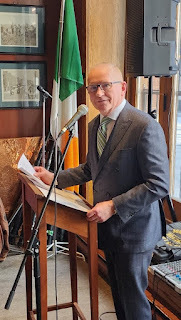 Like many others I was deeply shocked at the startof the month at the news of Sean’s death. I was unable to travel to his funeralin Toronto but I did send a message of solidarity and sympathy to Noelle,and Justin and Catherine. “Seán fought hard to stay with you andalthough it may not seem possible now I am sure your memories of him willsustain you in these difficult times. That’s what Sean would like. Tá arcroíthe briste libhse. No one knew Seán better than Noelle. No one had a betterDaddy than Catherine and Justin.”
Like many others I was deeply shocked at the startof the month at the news of Sean’s death. I was unable to travel to his funeralin Toronto but I did send a message of solidarity and sympathy to Noelle,and Justin and Catherine. “Seán fought hard to stay with you andalthough it may not seem possible now I am sure your memories of him willsustain you in these difficult times. That’s what Sean would like. Tá arcroíthe briste libhse. No one knew Seán better than Noelle. No one had a betterDaddy than Catherine and Justin.”
Seán was a Tyrone Minor Champion with Carrickmorein 1972 and a founder member the Loughmacrory St Teresa’s Club. He lined outwith them in their first ever competitive match in 1973. Like many Irish peopleover the centuries he decided to emigrate in search of a better life. Hetravelled to Toronto but never forgot Tyrone and never stopped playing for andbeing part of the growing GAA family in that huge country.
He was a founder member of Club Tyrone whichinvests in the GAA in his home country. Seán was the current secretary of theCanadian County Committee and a former chairperson of the organisation. Overmany years he played a pivotal role in organising GAA tours of Canada.
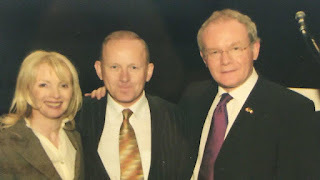 Sean was a decent man. He was always positive,generous, good natured and deeply proud of his family. Their loss is all thegreater because of this. Ní beidh a leitheid aris ann. Sean never forgot wherehe came from. He was Irish, Tyrone and Loughmacrory through and through.Fittingly he was named Irishman of the Year in Canada for 2023. Tyrone GAA intheir statement on his death put it well: “Although Seán spentvirtually all of a half-century in Canada, his was a stellar case of ‘theman maybe leaving Tyrone, but Tyrone never leaving the man’."
Sean was a decent man. He was always positive,generous, good natured and deeply proud of his family. Their loss is all thegreater because of this. Ní beidh a leitheid aris ann. Sean never forgot wherehe came from. He was Irish, Tyrone and Loughmacrory through and through.Fittingly he was named Irishman of the Year in Canada for 2023. Tyrone GAA intheir statement on his death put it well: “Although Seán spentvirtually all of a half-century in Canada, his was a stellar case of ‘theman maybe leaving Tyrone, but Tyrone never leaving the man’."
Seán was also a fior Gael. Steeped in Gaelicgames from boyhood and instrumental in expanding the Gaeldom inCanada. He fell ill at the Toronto GAA Convention in October.
Seán was a sound Irish Republican. He neverforgot his IRA brothers Gerard and Martin, executed along with Volunteer BrianMullin in 1988 by the SAS and the British Army near Drumnakilly in theirhomeland.
Sean was a stalwart supporter of Irish freedom andlike his late brother Nishey and the Harte family he was a staunchsupporter of the peace process.
I want to extend my deepest sympathies andcondolences to Noelle, and Justin and Catherine and to all of his familycircle, as well as to the GAA in Ireland and Canada and finally to Friends ofSinn Féin in Canada. We will all miss him. Thank you Sean for yourdedication and commitment. Mo comh bhrón le Noelle agus teaglach Sheáin.Ba laoch Seán Harte.
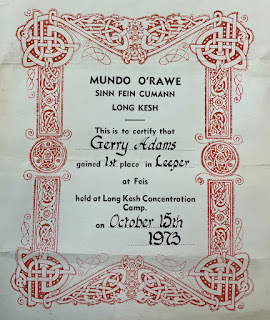
First Prize
I rediscovered this certificate last week. I was awarded it fifty years ago. It celebrates me winning the Leeper category in the annual Long Kesh Cage Feis organised by the local Sinn Féin Cumann. In our cage the Cumann was called after big Mundo or Eddie O’Rawe. Eddie was an IRA Volunteer executed by the British Army after they captured him down the Falls in Belfast, in April 1973. Eddie was a patriot and a gentleman.
The Mundo O’Rawe Sinn Féin Cumann organised lots of activity behind the wire. Debates and discussions. And all kinds of competitions. I was a very unlikely winner of the Leeper one. Incidentally, it should be Leaper not Leeper but who cares. It’s one of a kind. Some younger readers may wonder what a leeper is. In the Kesh the term was generally used to describe someone with dubious hygiene habits. It was also used to describe a place. For example his cell is leeping. It is probably derived from jumping. That toilet is jumping. Meaning it is smelly and unclean.
Bogging is another good word. It gave us the term bogger. I won that title one year also. Just saying. My comrades thought they were funny. I was neither leeping or bogging. I just didn’t conform to their Doc Martens, shin high Wrangler and denim clad attire. Or skin head hair styles. My hair was long. So was my beard. How that amounts to me being a leeper is debateable. But I’m used to getting blamed in the wrong. And I’m glad I rediscovered my certificate.
Palestine.
The awfulness of the Israeli State’s onslaught on Gaza continues to shock people in Ireland and throughout the world. The mobilisation of people everywhere is admirable. It is crucially important that we do not stop our demand for a Ceasefire. That means Hamas as well as Israeli forces. It means international law being applied. As this column goes to print it appears there may be some positive news on the release of hostages. If that happens it will be good. But much more is required. A negotiated peace process is urgently needed allied to emergency aid for the region. Ceasefire Now.
November 20, 2023
Fr. Alec Reid: Making Magic at the Ard Fheis
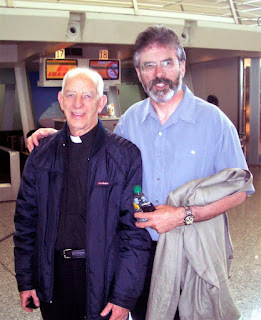 Fr. Alec Reid
Fr. Alec ReidNext Wednesday – 22 November –will mark the tenth anniversary of the death of Father Alec Reid. It is amatter of wonderment that a decade has passed since he left us. Studentsof the Irish peace process will know that Alec was a central figure in oursearch for peace. He and Fr. Des Wilson were key to the beginning of thatprocess. I won’t deal in this column with all the twists and turns ofthose times or the stubborn refusal for decades of the establishments,British and Irish, to embrace dialogue. Fr Alec and Des helped to changethat. And much more. This column reflects on some of Fr Alec’s qualities.
First of all Alec was an innovatorand in many ways a free spirit. He was a priest so he believed in God but hisGod was not a distant supreme force. His God was in everyoneand Alec believed that everyone deserved to be treated properly. In hisview the work of God – and therefore the work of the priest - was to beamong people upholding their rights. Fr Alec’s work with the Traveller Communityin Belfast was a great example of this.
He was a friend to the people likethe Traveller families who were victimised. He also believed that‘ordinary’ people had a great wealth of goodness, wisdom and experience.Especially women. He developed this thinking and formed a view that theChurch’s attitude to women was wrong.
He believed the Holy Spirit works inus all. “Do your best and don’t blame yourself. It will work out if you give it100 percent. It’s over then to the Holy Spirit.” Having said that he was like aterrier, never giving up. He found ways to engage with people in powerfulpositions from Taoisigh, Ambassadors, senior Government and political leaders.His work with John Hume was central to all that followed.
He was also personally brave. Hispresence on the streets in very dangerous times especially during the Battle ofthe Funerals in the mid and late 80s is proof of that. Photos of toughinteractions between family, neighbours and comrades of Republican dead and theRUC and the British Army, when the Church Hierarchy sided with theoppressors, often feature Fr. Alec in the midst of the throng trying to calmthings down.
His main peace-making principles arebased on the dignity of the human being and the right of everyone to be treatedproperly and with respect – do onto others as you would do on to yourself.And the primacy of dialogue. He was a good listener. And alwayswilling to reach out for advice from whoever he thought might be of help. He also understood his role, especially the role of a go between. Many othershave made a mess of this by exaggerating their own role or the positions ofthose they engage with. Their intentions were usually good intentions but thereare lots of do gooders who made matters worse and wasted peoples’ time. Fr Aleckept everything tight and straight in his role as go between even though hiswork was not confined to this.
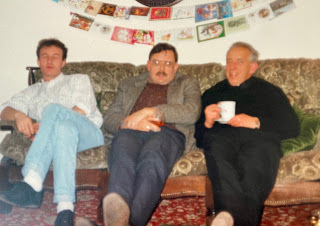 He had a good sense of humour. Heliked people. He enjoyed company, particularly the relationships he built withworking people including working class loyalists and republicans. He lovedGaelic games, especially hurling. He liked being out and about. He and I usedto walk together when his health allowed him. His roots were in Tipperary– he played minor hurling there but he supported Dublin as well in thefootball. The Rice brothers of Éire Óg were often called upon to get him CrokePark tickets. He used to come to our house on Christmas Eve to enjoy thecraic and banter with our other festive visitors. He and Colette were good friends.
He had a good sense of humour. Heliked people. He enjoyed company, particularly the relationships he built withworking people including working class loyalists and republicans. He lovedGaelic games, especially hurling. He liked being out and about. He and I usedto walk together when his health allowed him. His roots were in Tipperary– he played minor hurling there but he supported Dublin as well in thefootball. The Rice brothers of Éire Óg were often called upon to get him CrokePark tickets. He used to come to our house on Christmas Eve to enjoy thecraic and banter with our other festive visitors. He and Colette were good friends.
He was very respectful about hisfellow priests although he skirted around them if they were slow or reluctantor disapproving of his work. “Fr ….. is too holy.” He remarked to me one day byway of explanation for the perceived shortcomings of a brotherpriest
He could also be very impatient atthe ‘great and the good’ and angry at their double standards. He was veryinfluenced by Fr. Des Wilson. Alec probably would not have survived as adiocesan priest. The Redemptorists gave him space and ‘protection’ to dohis work. He tried to institutionalise this within the Order, particularly inClonard. So he was aware of the need to structure his work and for the churchleadership to face up to its responsibilities to fulfil its mission by dealingwith issues of justice, equality and rights. He became very aware of theshortcomings of the Church and of its controlling nature and its leadership’ssubservient relationship with and as part of the establishment.
He was proud to be a priest. Thescandals of child abuse wounded him greatly. He told me he missed not beingable to be in the company of children or to give a child a hug because of howthat might be misconstrued. But he always wore his clerical collarpublicly in defiance during those difficult times for good priests.
In our troubled world today his peacemaking principles remain totally relevant. For sure we would not havedeveloped our peace process when we did without Father Alec. Go ndeanfaidh Diatrocaire air.
The Palestinian Ambassador - Dr Jilan Wahba Abdalmajid
Makingmagic at the Ard Fheis
There have been Sinn Féin ArdFheiseanna that have had their special, magical moment that remains in thememory years – even decades - later. Last weekend’s Ard Fheis in Athloneproduced two such moments. The first came just before 1pm on Saturday. MattCarthy TD - the party’s spokesperson on Foreign Affairs -introduced the Palestinian Ambassador DrJilan Wahba Abdalmajid.
At the end of his remarks in which heexcoriated Israel for its countlessbreaches of international law, brutal acts of oppression, annexation, apartheidand ethnic cleansing Matt loudly chanted; “In our thousands and in ourmillions, we are all Palestinians”. As he repeated this a second time it wastaken up by the hall. By the third time everyone was applauding and shouting;“In our thousands and in our millions, we are all Palestinians.” For anamazing moment the Ard Fheis was the heart and soul of Ireland reaching intoGaza and the West Bank as we all welcomed the Ambassador.
Later Mary Lougave one of the best ever Presidential speeches. With four major electionslikely this year she proclaimed, “We wantto build a new Ireland. A nation home for all. A unified nation ofconfidence and compassion, talent and ingenuity, claiming our future, ourrightful place among the nations of the world. The Orange and Greenreconciled. No place for racism, Islamophobia, anti-Semitism, sexism,homophobia, transphobia, or sectarianism. Where there is no them - onlyus. All of us who call Ireland home.”
Mary Lou also spoke about the Israelistate’s genocide of Palestinians.
“The Palestinian people have a rightto their homeland,” she said… the Irish government should take the lead andrefer Israel to the International Criminal Court. And send the IsraeliAmbassador home… Israel must stop its slaughter in Gaza. Hamas must release allhostages. Ceasefires must be called”.
In a speech that was riveting,confident and empowering Mary Lou spoke of the need for change and oftransforming Ireland to resolve the housing crisis, resourcing health, tacklingthe climate crisis, and much more. She called on the Irish government toestablish a Citizens’ Assembly on Unity.
And at a time when some British andUnionist politicians are trying to rewrite the terms of the unity referendum inthe Good Friday Agreement Mary Lou said: “The day is coming when everyone onthis island will have their say in referendums. Each vote counting equally, novetoes, no shifting of the goal posts. Irish Unity is the very best opportunityfor the future. In the words of Rita O’Hare, “We must keep going. A UnitedIreland lies ahead”.
Another magical moment.
November 17, 2023
The Unity Debate is growing: Ethnic Cleansing: Crann na Saoirse
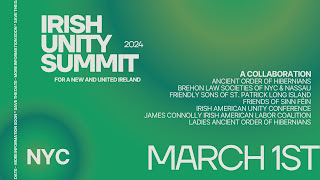
The UnityDebate is growing
Seven keyIrish-American organisations have announced an ‘Irish Unity Summit – For a Newand United Ireland’ to be held in New York on 1st March nextyear. This major initiative – coming as it will just before St. Patrick’s Dayand the visit to the USA of political leaders from Ireland – is being organisedby the Ancient Order of Hibernians; the Brehon Law Societies of NYC and Nassau;the Friendly Sons of St. Patrick Long Island; Friends of Sinn Féin; IrishAmerican Unity Conference; the James Connolly Irish American Labor Coalition,and the Ladies Ancient Order of Hibernians. More details on the format andspeakers will be announced by the organisers later.
On June 15 nextyear Ireland’s Future will be holding a major conference – Pathway to Change -in the SSE Arena in Belfast. Professor Brendan O’Leary, Claire Mitchel, JarlathBurns, Mary Lou McDonald and Claire Hanna are among speakers already confirmed.
Last weekQueen’s Human Rights academic and Ireland’s Future member Professor ColinHarvey was the guest speaker at an event organised by the National Committee onAmerican Foreign Policy at Fordham University in New York. Speaking on thetheme, ‘A Pathway to a new Ireland’ Colin Harvey said: “In Ireland the evidenceof an increased focus on preparations for change is everywhere. Theconstitutional conversation is moving into a much more detailed planning phaseand it is therefore essential that local and global voices for a new and unitedIreland are heard and listened to.” Professor Harvey told his audience thatthere is a particular onus on the Irish government to facilitate thepreparations for unity.
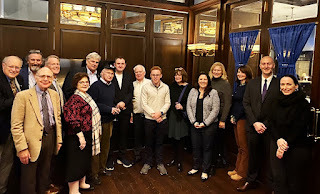 Later duringhis visit Professor Harvey met with the Brehon Law Society. He told them thathe believes that by the end of this decade there willbe a unity referendum.
Later duringhis visit Professor Harvey met with the Brehon Law Society. He told them thathe believes that by the end of this decade there willbe a unity referendum.
Last week also Ireland’s Future helda packed business lunch in the Europa Hotel in Belfast. Over 300 people heardformer BBC journalist Gavin Esler speak of the potential for change. The formereditor of the Irish News Noel Doran also addressed the gathering.
And finally, two weeks ago Trade Unionists for a New Ireland (TUNUI) held a two dayconference in Belfast. It heard a range of speakers from Ireland andinternationally talk about the importance of constitutional change and ofsocial justice to any new Ireland.
The two-day event brought togetherpeople from across the island and beyond with the aim of advancingconstitutional change. Among the speakers was SIPTU deputy general secretaryGerry McCormack and Frank Connolly, author of United Nation - The Casefor Integrating Ireland.
The Chair of TUNUI Seán McElhinneysaid: " We believe that some of the worst aspects of social inequality andsocio-economic disadvantage facing working people can only be addressedproperly by changing how Ireland is governed - north and south … Constitutionalchange gives us a unique opportunity to start building something better thanthis, and we want to promote the importance of social justice in everyconversation about our future."
EthnicCleansing
By the time you read thiscolumn the numbers of people killed in Gaza will have exceeded 10,000. Almosthalf of these are children. Every minute, of every hour, of every day newand dreadful images emerge from Palestine that horrify and shock.
This is not the first time that thePalestinian people have faced ethnic cleansing. In 1948 the Nakba orCatastrophe witnessed the ethnic cleansing of almost 80% of historic Palestineby the newly established Israeli state. In the decades since then an Israeliapartheid system has dehumanised and demonised the Palestinian people.
The Palestinian people of Gaza andthe west Bank are facing a second Nakba. The settler and Israeli Army violencein the west Bank, the deliberate attacks in Gaza on hospitals, schools, theUniversity, refugee camps, bakeries, ambulances and families and the cuttingoff of fuel and food and water, is about forcing Palestinians into abandoningGaza. A recent Israeli report and public commentary by Israeli leaders haveacknowledged that Israel seeks the expulsion of all Palestinians from Gaza. AnIsraeli Government minister Amichai Eliyahu has said nuking Gaza ‘is oneof the possibilities’ and in a remark reminiscent of ‘To Hell or Connacht’ that the Palestinians ‘can go to Ireland or deserts’.
Last week 200academics on the island of Ireland united in demanding that Irish universitiescut ties with Israeli institutions “untilthe occupation of Palestinian territory is ended, the Palestinian rights toequality and self-determination are vindicated, and the right of Palestinianrefugees to return is facilitated.” They are right.
Several days ago Mary Lou McDonald called on the Irish government andinternational community to take action to enforce international law. She alsocalled for the Israeli Ambassador to lose her diplomatic status. Other stateshave already broken diplomatic ties with Israel.
An immediate ceasefire and the infusion of substantial international aidis now essential but we should be under no illusions. There can be no victorsthrough war in the Middle East. If the international community fails to standup for international standards and international law then what we havewitnessed in the last month will only be repeated in the future.
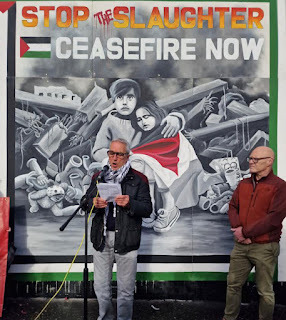
Crann Na Saoirse.
This is tree planting time. Again.Any month with an ‘R’ will do but it’s usually best between October andMarch. But plant your wee baby trees well before or well afterthe frost kicks in. I always try to do my planting in the Autumn so the treewill have time to settle in before Spring. Container grown trees can be plantedat any time, though they too need protected from frost but I mostlyuse bare root or wee slips grown from seed.
I collect the seeds, mainly chestnutsand acorns from the Falls Park along with Rowan, Hazel, Hawthorn andBirch.
Back in the day when our lives wereconsumed with endless talks I gathered up seed from the great housesof England, like Chequers, the back garden of 10 DowningStreet, Leeds Castle or back home at Hillsborough, Arbour Hill or theÁras.
There are all kinds of littleprocesses and different soil, gravel or sand mixes which you can use forbringing on your seeds but I’m a lazy gardener. I just put the seeds intoa pot of whatever loam I have to hand and let nature do its work.
When the seeds have sprouted thesaplings can be kept in pots for years before planting out. Apart from chestnutsI plant only native species. They are good for keeping the air clean. Good fornative insects. For native birds and other creatures. Good for theclimate and nature. Trees are also great presents. They can mark thebirth of a new baby or immortalise the memory of a fallen friend. Trees aregood for remembering the living and the dead. They are about thefuture.
That is why Freedom Trees areimportant. Crann Na Saoirse can be planted now in the knowledge that theywill grow tall in a free Ireland.
So why not plant your own Crann NaSaoirse. Or if you have the space or access to public land or commonage, ahill or mountain side - with permission- why not plant A FreedomForest? Even ten or twenty trees planted two metres apart willlook well once they get going. Is there space in your housing estate? Or yourfarm? Your garden? Your sports ground.
Native trees are are alsogood for biodiversity. No one could object to that. So get growing.
November 6, 2023
Ceasefire Now; Wolfe Tone's Cordial Union:Pulse and Mickey Coleman
Ceasefire Now
News from the Middle East continues to numb andoutrage and anger most people. But we cannot give up. We have a duty to thepeople of Palestine to stay focussed on the demands to Stop the War - SupportHumanitarian Initiatives - Start Peace Talks. The people of Israel andPalestine need the support of the international community. We are part ofthat community. Let us find ways to get our leaders to upholdinternational law. End the siege of Gaza. Free Palestine.
WolfeTone’s Cordial Union
Lastweek I attended an event in Parliament Buildings at Stormont, hosted by USSpecial Economic Envoy Joe Kennedy. There was a panel discussion on the impactof the Good Friday Agreement which involved myself, former DUP leader PeterRobinson; former Alliance Assembly Speaker Eileen Bell; Lady Daphne Trimble,President of the Ulster Unionist Party; and former SDLP leader Mark Durkan.First Minister designate Michelle O’Neill, DUP leader Jeffrey Donaldson and UUPleader Doug Beattie were all present.
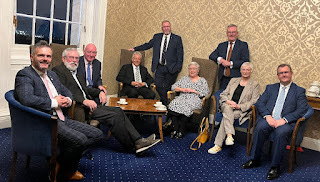 Whilewe each brought our own narrative of that time to the conversation it wasnonetheless a positive and forward looking engagement.
Whilewe each brought our own narrative of that time to the conversation it wasnonetheless a positive and forward looking engagement.
Theday before Jeffrey Donaldson said there would be no united Ireland in hislifetime and that a United Ireland cannot accommodate his Britishness. Idisagree. The fact is that political and demographic changes in recent decades;a growing disillusionment with the unionist parties; the Brexit debacle and thegrowth of Sinn Féin have contributed to increasing interest in Irish Unity. Itis also important to recall that over 70% of people in the North and over 90%in the South voted in May 1998 for an Agreement that provides for a unityreferendum and for a simple majority to determine the outcome. That providesthe democratic basis for future constitutional change.
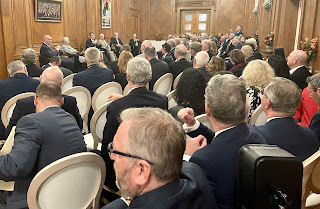 Asfor the British identity in a United Ireland? Those of us who favour IrishUnity have repeatedly emphasised our commitment to respect the British identityof our neighbours and to accommodate that identity and its traditions in a newand shared Ireland. We are also committed to the safeguards and guarantees, containedin the Good Friday Agreement, being carried through into that newIreland.
Asfor the British identity in a United Ireland? Those of us who favour IrishUnity have repeatedly emphasised our commitment to respect the British identityof our neighbours and to accommodate that identity and its traditions in a newand shared Ireland. We are also committed to the safeguards and guarantees, containedin the Good Friday Agreement, being carried through into that newIreland.
Thatis not just a rhetorical commitment aimed at winning unionist support for oracquiescence to Irish Unity. It is rooted in the principles and beliefs ofthose – mainly Presbyterians - who embraced Republicanism in the 18th century.
TheUnited Irish Society was founded in Belfast in October 1791. It was the firstdemocratic movement in Ireland and took its inspiration from the American andFrench Revolutions of that time. They sought solidarity between people of allreligious denominations, and political equality and Irish independence.
TheobaldWolfe Tone – who belonged to the Church of Ireland - embodied the new alliancebetween Protestants and Catholics. His writings remain relevant to thisgeneration and this time.
Tone,who served as secretary of the Catholic Committee, said his aim was: “Tounite the whole people of Ireland, to abolish the memory of all past dissensionand to substitute the common name of Irishman in place of the denominations ofProtestant, Catholic and Dissenter – these were my means.”
Infacing up to a succession of economic and political crises then created by theEnglish government Tone concluded that; “Ireland would never be eitherfree, prosperous, or happy, until she was independent, and that independencewas unattainable, whilst the connexion with England existed.”
Tobuild a new society Tone argued for a new relationship between the people ofIreland. He wrote: “the weight of English influencein the Government of this country is so great as to require a cordial unionamong all the people of Ireland, to maintain that balance which is essential tothe preservation of our liberties and the extension of our commerce.”
Asthe momentum toward a unity referendum grows and as more and more positive voicesare being heard from the unionist/British section of our people the objectiveof building a cordial union among the people of this island takes on a greatersignificance. British governments are not to be trusted in protecting therights of citizens or managing our economy. Agreements between Unionist leadersand British governments have been consistently dumped by British PrimeMinisters who time and time again have placed British self-interest abovecommitments given to unionists.
Thefuture provides an opportunity to build a new relationship between the peoplewho share this island. A new cordial union – founded on inclusion andreconciliation – on democratic agreements and respect. We are an island peoplein transition. A fundamental part of this transition must be a sustained effortto genuinely address the fears and concerns of northern unionists. As goodneighbours we must explore with them what they mean by their sense ofBritishness and how that sense of Britishness will be reflected in a new cordialunion between the people of this island. This is the future.
Mickey Coleman , his wife Erin and their sonsMicheál and Riordan were in An Cultúrlann last week on Belfast’s Falls Road tolaunch Mickey’s new book PULSE. Peter Canavan was there also along with mé féin.I never thought I would be on a panel with Peter Canavan - one of myfootballing heroes and all Ireland champion with Tyrone. Twice. But there wewere telling yarns and sharing songs and funny stories. And a bunch of finesingers from Glassdrummond entertained us and moved everyone with theirrendition of The Brantry Boy.
PULSE is a special book, written with DamianHarvey, and it tells Mickey’s story. Its a story of his family in Ardboe a weevillage in a beautiful part of rural Ireland beside Lough Neagh. It’s thestory of an Irish family of eight children, nurtured byTeresa and her husband Sean. It is a story of Mickey kicking ball on theGreen with his brothers and childhood mates and then with the localGaelic Athletic Club - O Donavon Rossa. The heart of Ardboe.
It’s about schooldays, meeting Peter Canavanwhen he came to teach in Holy Trinity College in Cookstown. It’s about fishingon Lough Neagh with his father. About British troops. Visits to his fatherin Belfast Prison. It’s a book about music, song writing, guitar picking. Doinglocal gigs. Visiting the USA. Getting on to the county football panel. It’sabout that brilliant first Tyrone team to win the Sam Maguire Cup. It’s aboutMickey Harte, legendary manager. It’s about Cormac Mac Anallen, oneof Tyrone’s finest, who died suddenly, aged just twentyfour. The Brantry Boy.
It’s about New York. About Mickey knuckling downand working hard supported by others including Fay Devlin. About meeting ErinLoughran as she played the fiddle at a session. About Erin and Mickeymaking music together. Then making babies.
Mickey’s business was going well. He was blessedwith a great family and friends. Immersed in the Gaeldom of New York.
Then on 29 March 2021, aged forty one,Mickey had a massive heart attack. That’s when his life ended. Thanks to Erin,his own resilience and self-awareness as he confronted his ‘widow maker’ andOrangetown police and other emergency workers, he survived. Montefiores NyackHospital did the rest and kept him alive.
And then it was a long hard struggle for Mickey toget back to himself again. This book tells all this and much more. It isespecially poignant as Mickey recounts how he relearned what isimportant in life. It’s all here with wonderful clear and hopeful faith inlove, family, friendship, community, Ireland and humanity. Mickey’sappeal to the reader is for us all to play our own music inappreciation of what we have - not just materially but more importantly - inour values. Because without those we have nothing. That is the essence ofPulse. Read it for yourself. I’m honoured that Mickey invited me to help launchhis story. Thank you.
PULSE lets us know that Mickey and Erin havenever forgotten where they are from and who they are. I wish them both andtheir family the very best of good luck for the future.
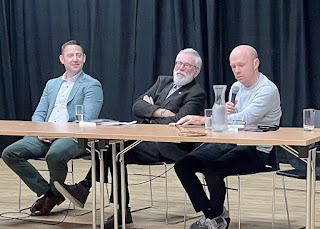
October 30, 2023
We are all Palestinians Now: Peacemakers
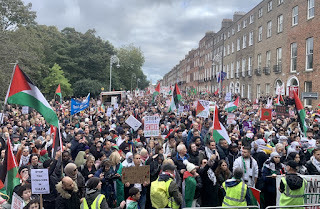 We are all Palestinians Now
We are all Palestinians NowLast week as I wrote this column all of the scéalcoming from the Israeli government and its international allies indicated thata ground invasion of Gaza was imminent. It would, according to some be a ‘surgicalstrike against Hamas’. From British government Ministers, to politicalpundits, to international allies of the Israeli government, to Israelispokespersons the aim – they say - is to destroy Hamas.
It’s all nonsense of course. The reality is thatIsrael can no more destroy Hamas than Hamas can destroy Israel.
The ground invasion has now begun. The civilian deathtoll is rising. The claim that in a military ground invasion of Gaza Israelwill be mindful of civilians is also a nonsense. In the past two decadesIsraeli attacks on and assaults into Gaza and more recently against Palestinianpeople in the west Bank have produced overwhelming evidence of an Israeliapartheid state that views Palestinians as inferior, without rights. They are,according to the Israeli Defence Minister recently, ‘human animals.’
Over the last few weeks over 100 Palestinians,including at least 30 children, have been shot dead in the west Bank by Israelisnipers. 2000 Palestinians, including many children have been wounded. As thehorrific casualty list from Gaza mounts each day events on the west Bank arerarely reported.
Even if Israel occupies the rubble of a Gaza Citylevelled by its scorched earth policy of ethnic cleansing, forcibly evicts orkills those Gazans living in the northern half of that territory, and annexesit as part of a land grab for the greater Israeli state envisioned byNetanyahu, this will all have the opposite effect its strategists arepredicting. The history of colonialism is littered with examples of oppressedpeoples emerging stronger and more determined in pursuit of their right toself-determination.
If colonialism and our own experience teaches usanything it is that Israeli actions are more likely to embolden opposition toIsraeli occupation not defeat it. Past Israeli actions, the blockade of Gazafor almost 20 years, the flouting of international law and its apartheidpolicy, have not diminished the Palestinian desire for freedom and justice.
The failure of the international community to standup for international law and to defend Palestinian rights has led us to thiscurrent nightmare.
Moreover, there is now a real danger that theconflict will extend beyond Gaza and the west Bank and embroil the region. Itmay be several decades since Arab states and Israel clashed on the battlefieldbut concern at Israeli aggression is mounting in the neighbouring states. FromLebanon to Jordan to Syria, to Iran and Egypt tensions are rising. Thereare real risks of a calamitous escalation.
It is still not too late to turn back from theabyss. It will need leadership and courage by all sides and a willingness to takehuge personal and political risks for peace. It especially demands that theinternational community defend the Palestinian people of Gaza and of the westBank.
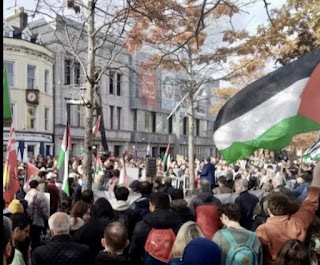 The massive solidarity demonstrations last weekendwith the Palestinian people in Ireland and around the world can help change thenarrative. The increasing numbers of voices demanding a complete cessation byall sides and an end to the humanitarian catastrophe that is taking place inGaza, are evidence too that there remains a deep well of compassion for allvictims.
The massive solidarity demonstrations last weekendwith the Palestinian people in Ireland and around the world can help change thenarrative. The increasing numbers of voices demanding a complete cessation byall sides and an end to the humanitarian catastrophe that is taking place inGaza, are evidence too that there remains a deep well of compassion for allvictims.
Declan Kearney, Sinn Féin National Chairperson,addressed the huge march of tens of thousands in London. He said: “Ahumanitarian catastrophe is taking place in Gaza – the likes of which we havenever seen. The world has a choice to make. To stand with the oppressed anddispossessed or Palestine, or not. We stand on the side of humanity, decency,universal democracy and international law. We are all Palestinians now.”
The Irish government is in a unique position todemand cessations and to be a voice within the international community fordialogue, ceasefires and a just settlement. The policy of neutrality andmilitary non-alignment has proven invaluable in allowing Irish governments touse the United Nations and other international bodies to win support in defenceof human rights.
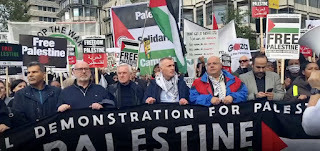 Uachtarán Michael D Higgins’recent assertion that the head of the European Commission Ursulavon der Leyen was "not speaking for Ireland” when shegave unqualified support for Israel was widely welcomed. His insistence thatthe international community “retain and insist on the veracity andcogency of international law” was also supported. His remarksunderline the importance of Irish neutrality. It must not be eroded orundermined.
Uachtarán Michael D Higgins’recent assertion that the head of the European Commission Ursulavon der Leyen was "not speaking for Ireland” when shegave unqualified support for Israel was widely welcomed. His insistence thatthe international community “retain and insist on the veracity andcogency of international law” was also supported. His remarksunderline the importance of Irish neutrality. It must not be eroded orundermined.
Following the Russian invasion of Ukraine there wasanger last year at comments by Micheál Martin that suggested that the FiannaFáil/Fine Gael/Green Party government was moving away from neutrality. Martinsaid: “We need to reflect onmilitary non-alignment in Ireland and our military neutrality.” His claim that: “We don’t need a referendum to join NATO. That’s apolicy decision of government” waschallenged and criticised.
The crisis in the Middle East and the illegal andbrutal assault on the people of Gaza reinforce the imperative of the policy ofneutrality.
By remaining neutral and non-aligned to militaryalliances the Irish government has the opportunity to build on the state’spositive contributions in the United Nations and to its peace keeping role.Ireland is known for our work on peace building and the protection of humanrights and fundamental freedoms. Irish neutrality has served the island ofIreland well and is generally welcomed by the majority of states within theU.N. This is evidenced by the support it received several years ago to join theUN Security Council.
Through diplomacy, humanitarianism, peace-buildingand co-operation we have the ability to make a real difference in internationalmatters; to play an important role in an increasingly dangerous world. Byinvesting in conflict resolution rather than conflict participation the Irishgovernment can make a solid, positive contribution to de-escalating thelanguage of war, sectarianism and racism.
Neutrality is not being isolationist. It is notabout indifference. It’s not about turning our backs on the world. As theInternational Committee of the Red Cross said two days ago neutrality is a wayof helping that allows “us to reach those who need it most.”
That means condemning those who breachinternational law – whether it is Hamas or Israel – and standing up for andwith an impoverished, imprisoned Palestinian people living under the brutalrule of apartheid. Silence in this dark time is complicity in the genocide ofthe people of Gaza.
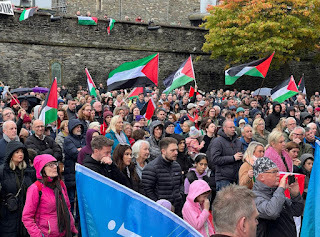
Peacemakers
30 yearsago last Monday an IRA bomb exploded on the Shankill Road killing nine people andIRA Volunteer Thomas Begley. It was a shocking event compounded a week laterwhen eight people were shot dead in Greysteel. These were two of manyatrocities which occurred during a quarter century of conflict in the North.Their impact on families and communities reverberates still today, as do themore than 3,000 other deaths and the thousands of injuries that resulted fromthose desperate years. The families of the dead and the injured have lived withthe consequences ever since.
Todaywe are in a much better place. Not least because many of those who suffereddirectly from the violence became peacemakers. Citizens willing to step beyondtheir own personal tragedies and provide support and comfort to the bereavedand injured and to become advocates for peace and for justice. We aremindful of their loss and grateful for their courage and dedication in breakingdown barriers. Alan McBride - who lost his wife Sharon and her father Desmondin the IRA bomb - is one such person. He is an example to the rest of us,including this columnist.
Tír Chonaill Thuaidh
Bhuail mé lespéirbhean
Ar bharrportaigh
I measc nasléibhte
I dTírChonaill Thuaidh.
Thug sí a lamhdom
Ar bharrportaigh
I measc nasléibhte
I dTírChonaill Thuaidh.
Thug mé póg di
Ar bharrportaigh
I measc nasléibhte
I dTírChonaill Thuaidh.
Fan anseoliom,
Arsa anspéirbhean
Ar bharrportaigh
I measc nasléibhte
I dTírChonaill Thuaidh.
October 26, 2023
We are all Palestinians Now: Peacemakers: Tír Chonaill Thuaidh
We are all Palestinians Now
The ground invasion of Gaza has begun. The Israeligovernment and its international allies previously claimed that will be a ‘surgicalstrike against Hamas’. From British government Ministers, to politicalpundits, to international allies of the Israeli government, to Israelispokespersons the aim – they say - is to destroy Hamas.
It’s all nonsense of course. The reality is thatIsrael can no more destroy Hamas than Hamas can destroy Israel.
In addition, the claim that in a military groundinvasion of Gaza Israel will be mindful of civilians is also a nonsense. In thepast two decades Israeli attacks on and assaults into Gaza and more recentlyagainst Palestinian people in the west Bank have produced overwhelming evidenceof an Israeli apartheid state that views Palestinians as inferior, withoutrights. They are, according to the Israeli Defence Minister recently, ‘humananimals.’
Over the last few weeks almost 100 Palestinians,including at least 30 children, have been shot dead in the west Bank by Israelisnipers. 1300 Palestinians, including many children have been wounded. As thehorrific casualty list from Gaza mounts each day events on the west Bank arerarely reported.
Even if Israel occupies the rubble of a Gaza Citylevelled by its scorched earth policy, forcibly evicts or kills those Gazansliving in the northern half of that territory, and annexes it as part of a landgrab for the greater Israeli state envisioned by Netanyahu, this will all havethe opposite effect its strategists are predicting. The history of colonialismis littered with examples of oppressed peoples emerging stronger and moredetermined in pursuit of their right to self-determination.
If colonialism and our own experience teaches usanything it is that Israeli actions are more likely to embolden opposition toIsraeli occupation not defeat it. Past Israeli actions, the blockade of Gazafor almost 20 years, the flouting of international law and its apartheidpolicy, have not diminished the Palestinian desire for freedom and justice.
The failure of the international community to standup for international law and to defend Palestinian rights has led us to thiscurrent nightmare.
Moreover, there is now a real danger that theconflict will extend beyond Gaza and the west Bank and embroil the region. Itmay be several decades since Arab states and Israel clashed on the battlefieldbut concern at Israeli aggression is mounting in the neighbouring states. FromLebanon to Jordan to Syria, to Iran and Egypt tensions are rising. Thereare real risks of a calamitous escalation.
It is still not too late to turn back from theabyss. It will need leadership and courage by all sides and a willingness to takehuge personal and political risks for peace. It especially demands that theinternational community defend the Palestinian people of Gaza and of the westBank.
The massive solidarity demonstrations last weekendwith the Palestinian people in Ireland and around the world can help change thenarrative. The increasing numbers of voices demanding a complete cessation byall sides and an end to the humanitarian catastrophe that is taking place inGaza, are evidence too that there remains a deep well of compassion for allvictims.
Declan Kearney, Sinn Féin National Chairperson,addressed the huge march of tens of thousands in London. He said: “Ahumanitarian catastrophe is taking place in Gaza – the likes of which we havenever seen. The world has a choice to make. To stand with the oppressed anddispossessed or Palestine, or not. We stand on the side of humanity, decency,universal democracy and international law. We are all Palestinians now.”
The Irish government is in a unique position todemand cessations and to be a voice within the international community fordialogue, ceasefires and a just settlement. The policy of neutrality andmilitary non-alignment has proven invaluable in allowing Irish governments touse the United Nations and other international bodies to win support in defenceof human rights.
Uachtarán Michael D Higgins’recent assertion that the head of the European Commission Ursulavon der Leyen was "not speaking for Ireland” when shegave unqualified support for Israel was widely welcomed. His insistence thatthe international community “retain and insist on the veracity andcogency of international law” was also supported. His remarksunderline the importance of Irish neutrality. It must not be eroded orundermined.
Following the Russian invasion of Ukraine there wasanger last year at comments by Micheál Martin that suggested that the FiannaFáil/Fine Gael/Green Party government was moving away from neutrality. Martinsaid: “We need to reflect onmilitary non-alignment in Ireland and our military neutrality.” His claim that: “We don’t need a referendum to join NATO. That’s apolicy decision of government” waschallenged and criticised.
The crisis in the Middle East and the illegal andbrutal assault on the people of Gaza reinforce the imperative of the policy ofneutrality.
By remaining neutral and non-aligned to militaryalliances the Irish government has the opportunity to build on the state’spositive contributions in the United Nations and to its peace keeping role.Ireland is known for our work on peace building and the protection of humanrights and fundamental freedoms. Irish neutrality has served the island ofIreland well and is generally welcomed by the majority of states within theU.N. This is evidenced by the support it received several years ago to join theUN Security Council.
Through diplomacy, humanitarianism, peace-buildingand co-operation we have the ability to make a real difference in internationalmatters; to play an important role in an increasingly dangerous world. Byinvesting in conflict resolution rather than conflict participation the Irishgovernment can make a solid, positive contribution to de-escalating thelanguage of war, sectarianism and racism.
Neutrality is not being isolationist. It is notabout indifference. It’s not about turning our backs on the world. As theInternational Committee of the Red Cross said two days ago neutrality is a wayof helping that allows “us to reach those who need it most.”
That means condemning those who breachinternational law – whether it is Hamas or Israel – and standing up for andwith an impoverished, imprisoned Palestinian people living under the brutalrule of apartheid. Silence in this dark time is complicity in the genocide ofthe people of Gaza.
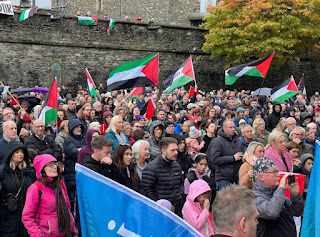
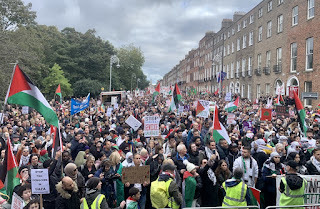
Peacemakers
30 yearsago on Monday an IRA bomb exploded on the Shankill Road killing nine people andIRA Volunteer Thomas Begley. It was a shocking event compounded a week laterwhen eight people were shot dead in Greysteel. These were two of manyatrocities which occurred during a quarter century of conflict in the North.Their impact on families and communities reverberates still today, as do themore than 3,000 other deaths and the thousands of injuries that resulted fromthose desperate years. The families of the dead and the injured have lived withthe consequences ever since.
Todaywe are in a much better place. Not least because many of those who suffereddirectly from the violence became peacemakers. Citizens willing to step beyondtheir own personal tragedies and provide support and comfort to the bereavedand injured and to become advocates for peace and for justice. We aremindful of their loss and grateful for their courage and dedication in breakingdown barriers. Alan McBride - who lost his wife Sharon and her father Desmondin the IRA bomb - is one such person. He is an example to the rest of us,including this columnist.
Tír Chonaill Thuaidh
Bhuail mé lespéirbhean
Ar bharrportaigh
I measc nasléibhte
I dTírChonaill Thuaidh.
Thug sí a lamhdom
Ar bharrportaigh
I measc nasléibhte
I dTírChonaill Thuaidh.
Thug mé póg di
Ar bharrportaigh
I measc nasléibhte
I dTírChonaill Thuaidh.
Fan anseoliom,
Arsa anspéirbhean
Ar bharrportaigh
I measc nasléibhte
I dTírChonaill Thuaidh.
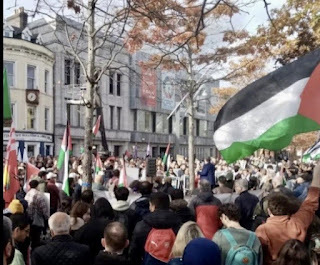
Gerry Adams's Blog
- Gerry Adams's profile
- 29 followers


